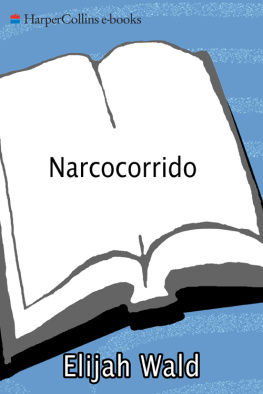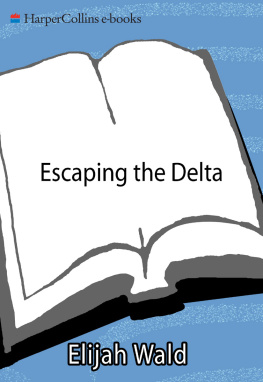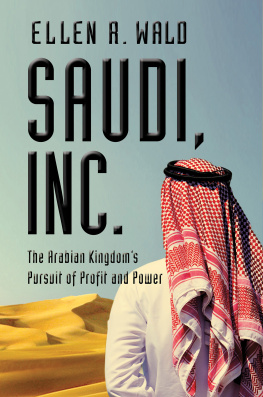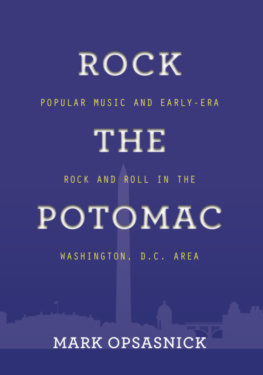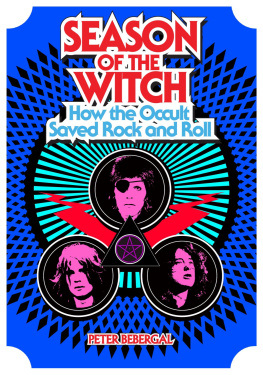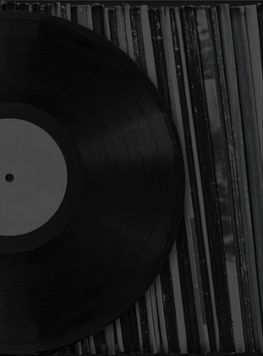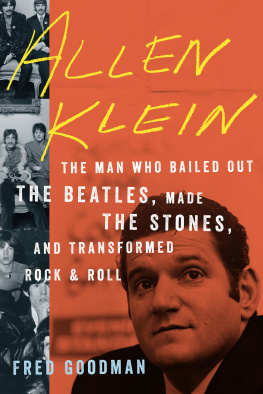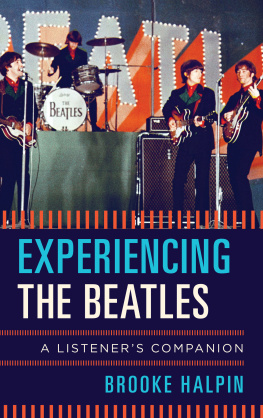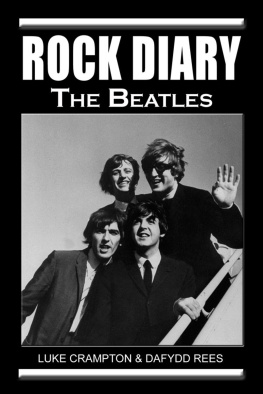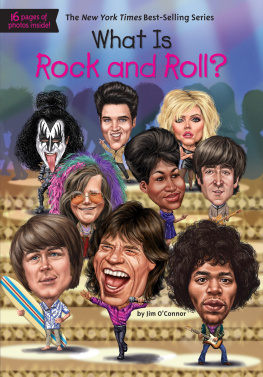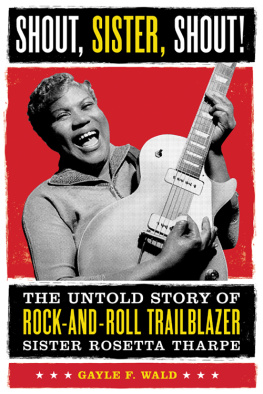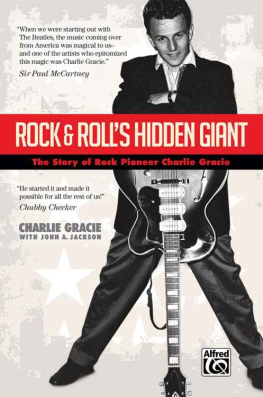Wald - How the Beatles destroyed rock n roll: an alternative history of American popular music
Here you can read online Wald - How the Beatles destroyed rock n roll: an alternative history of American popular music full text of the book (entire story) in english for free. Download pdf and epub, get meaning, cover and reviews about this ebook. year: 2009, publisher: Oxford University Press USA - OSO, genre: Home and family. Description of the work, (preface) as well as reviews are available. Best literature library LitArk.com created for fans of good reading and offers a wide selection of genres:
Romance novel
Science fiction
Adventure
Detective
Science
History
Home and family
Prose
Art
Politics
Computer
Non-fiction
Religion
Business
Children
Humor
Choose a favorite category and find really read worthwhile books. Enjoy immersion in the world of imagination, feel the emotions of the characters or learn something new for yourself, make an fascinating discovery.

- Book:How the Beatles destroyed rock n roll: an alternative history of American popular music
- Author:
- Publisher:Oxford University Press USA - OSO
- Genre:
- Year:2009
- Rating:4 / 5
- Favourites:Add to favourites
- Your mark:
- 80
- 1
- 2
- 3
- 4
- 5
How the Beatles destroyed rock n roll: an alternative history of American popular music: summary, description and annotation
We offer to read an annotation, description, summary or preface (depends on what the author of the book "How the Beatles destroyed rock n roll: an alternative history of American popular music" wrote himself). If you haven't found the necessary information about the book — write in the comments, we will try to find it.
How the Beatles destroyed rock n roll: an alternative history of American popular music — read online for free the complete book (whole text) full work
Below is the text of the book, divided by pages. System saving the place of the last page read, allows you to conveniently read the book "How the Beatles destroyed rock n roll: an alternative history of American popular music" online for free, without having to search again every time where you left off. Put a bookmark, and you can go to the page where you finished reading at any time.
Font size:
Interval:
Bookmark:
HOW THE BEATLES DESTROYED ROCK N ROLL
OTHER BOOKS BY ELIJAH WALD
Josh White: Society Blues
River of Song: A Musical Journey Down the Mississippi (with John Junkerman)
Narcocorrido: A Journey into the Music of Drugs, Guns, and Guerrillas
Escaping the Delta: Robert Johnson and the Invention of the Blues
The Mayor of MacDougal Street: A Memoir (with Dave Van Ronk)
Riding with Strangers: A Hitchhikers Journey
Global Minstrels: Voices of World Music
AN ALTERNATIVE HISTORY OF AMERICAN POPULAR MUSIC
ELIJAH WALD


Oxford University Press, Inc., publishes works that further Oxford Universitys objective of excellence in research, scholarship, and education.
OXFORD NEW YORK
Auckland Cape Town Dares Salaam Hong Kong Karachi
Kuala Lumpur Madrid Melbourne Mexico City Nairobi
New Delhi Shanghai Taipei Toronto
WITH OFFICES IN
Argentina Austria Brazil Chile Czech Republic France Greece
Guatemala Hungary Italy Japan Poland Portugal Singapore
South Korea Switzerland Thailand Turkey Ukraine Vietnam
Copyright 2009 by Elijah Wald
Published by Oxford University Press, Inc.
198 Madison Avenue, New York, New York 10016
www.oup.com
Oxford is a registered trademark of Oxford University Press
All rights reserved. No part of this publication may be reproduced, stored in a retrieval system, or transmitted, in any form or by any means, electronic, mechanical, photocopying, recording, or otherwise, without the prior permission of Oxford University Press.
Library of Congress Cataloging-in-Publication Data
Wald, Elijah.
How the Beatles destroyed rock n roll : an alternative history of American popular music / Elijah Wald.
p. cm.
Includes bibliographical references and index.
ISBN 978-0-19-534154-6
1. Popular musicUnited StatesHistory and criticism. I. Title.
ML3477.W35 2009
781.640973dc22 2008042265
ROCK IT FOR ME
Words & Music by Kay Werner and Sue Werner
As sung by Ella Fitzgerald
Copyright 1938 (Renewed) Words & Music, Inc., New York, NY
Used by Permission
Rock the Joint written by Harry Crafton, Henry (Doc) Bagby, and Wendell (Don) Keene Published by Andrea Music (SESAC) Lyrics reprinted with permission of Andrea Music and www.oldies.com (1-888-My-Oldies).
9 8 7 6 5 4 3 2 1
Printed in the United States of America
on acid-free paper
DEDICATED TO THE MEMORY OF JEFF McLAUGHLIN, WHOSE SUPPORT AND CRITICISM HELPED ME SO OFTEN OVER THE YEARS, AND WHOSE PRESENCE IN THIS BOOK AND IN MY LIFE IS SORELY MISSED.
This is an exciting time to be writing about popular music. A flood of insightful, well-researched books and papers is transforming our view of the past, and the Internet has provided unprecedented access to recordings, documents, and scholars around the world. I cannot possibly acknowledge everyone whose work influenced and educated me over the course of this project, but I want to emphasize that I had a lot of help. I am pleased to have unearthed some interesting and unfamiliar tidbits and hope I convey some of the surprise I felt as my preconceptions were overturned, but I am following in the footsteps of a century of predecessors, many of whom were able to look at the evidence in greater depth and at closer hand, and I am very conscious of following the trails they blazed.
In the past two years I have talked and corresponded with dozens of historians, critics, and collectors, read hundreds of books and articles, and listened to thousands of recordings. It was a rich and fascinating process, and the names that follow are only a small sample of the people to whom I owe a debt for their efforts, aid, and advice.
I must give special thanks to the friends and colleagues who read parts of my manuscript, suggesting changes and catching my errors, and especially to Matthew Barton, whose breadth of knowledge never ceases to amaze me and who gave thorough notes on the whole damn thing. Also Lynn Abbott, Daphne Brooks, Ken Emerson, Robert Forbes, Reebee Garofalo, Bernard Gendron, Peter Guralnick, Keir Keightley, James Kraft, and Ned Sublette, as well as Susan McClary, whose encouraging words were much appreciated.
One of the great pleasures of this project was that it gave me an excuse to contact people whose names or work were familiar to me, as well as to look up some old friends. In general, I avoided doing interviewslargely because if I had started down that road I would never have finished the bookbut in a few cases I couldnt resist, and I thank Charlie Gracie, Art Laboe, and Dale Hawkins for taking the time to talk with me. The list of other people I consulted could go on forever, and I hope I will not annoy anyone whose name is not here by mentioning Kate Bergh, Donald Clarke, Scott DeVeaux, Daniel Goldmark, Lawrence Gushee, Brad Kay, Michael Kieffer, Gene Lees, Jeffrey Magee, Dan Morgenstern, Dominic Priore, Ben Quinones, Bruce Boyd Raeburn, Rosetta Reitz, Christopher Robinson, Jody Rosen, Howard Rye, Marc Schechtman, Bruce Vermazen, Eric Weisbard, and Henrietta Yurchenko.
For their kind assistance in providing me with research materials, many thanks to the staffs of the Rutgers Institute of Jazz Studies; the Browne Popular Culture Library, Music Library, and Sound Recordings Archives of Bowling Green State University; the Hogan Jazz Archive at Tulane University; the Los Angeles Public Library; and, above all, to Bridget Risemberg and everyone at the University of California Los Angeles Music Library. Thanks also to Robert Walser and Raymond Knapp, who brought me to UCLA and made this task far easier than it would have been otherwise, as well as always being available for illuminating conversations.
I am indebted to Michael Fitzgerald for his Jazz Research Internet list, Scott Alexander for supplying me with Whitemans recordings, Stephan Michelson for several boxes of books and magazines, Mike Daley for his dissertation on rock historiography, and the folks at Archeophone Records, redhotjazz.com , jazz-on-line.com , and numerous other Internet sites for making so much wonderful music available.
And last but far from least, thanks to all the people involved in the production of this book, including my agent, Sarah Lazin, who found it a good home; my editor, Suzanne Ryan, who believed in it from the first; Christine Dahlin and the production staff at Oxford; my copyeditor, Elaine Kehoe; and Sandrine Sheon and Martine Bruel, my wife and her mother, who along with moral support provided expertise in graphic design.
HOW THE BEATLES DESTROYED ROCK N ROLL
You do not have to love a work of art or a style in order to criticize it, but you need to understand its attraction for someone who does.... Criticism has no significance and no importance if it is not accompanied by understandingand that implies the comprehension of at least the possibility of love.
CHARLES ROSEN
The first record I ever owned was side two of Meet the Beatles. It was a birthday present from a Danish au pair, who had given side one to my younger sister. My sisters birthday is three days before mine, and in between the au pair neatly rewrapped the album, then gave me side two. It was 1965, and I was turning six.
I suppose I should have been aware of the Beatles before that, as my family had spent the previous year in England, but all I remember of that year was finding a bomb shelter and a hibernating hedgehog, and my enduring perplexity about a word I heard as lava tree. And once, on a drive to London, noticing a person with long hair and a beard and being confused about whether it was a man or a woman.
Next pageFont size:
Interval:
Bookmark:
Similar books «How the Beatles destroyed rock n roll: an alternative history of American popular music»
Look at similar books to How the Beatles destroyed rock n roll: an alternative history of American popular music. We have selected literature similar in name and meaning in the hope of providing readers with more options to find new, interesting, not yet read works.
Discussion, reviews of the book How the Beatles destroyed rock n roll: an alternative history of American popular music and just readers' own opinions. Leave your comments, write what you think about the work, its meaning or the main characters. Specify what exactly you liked and what you didn't like, and why you think so.

